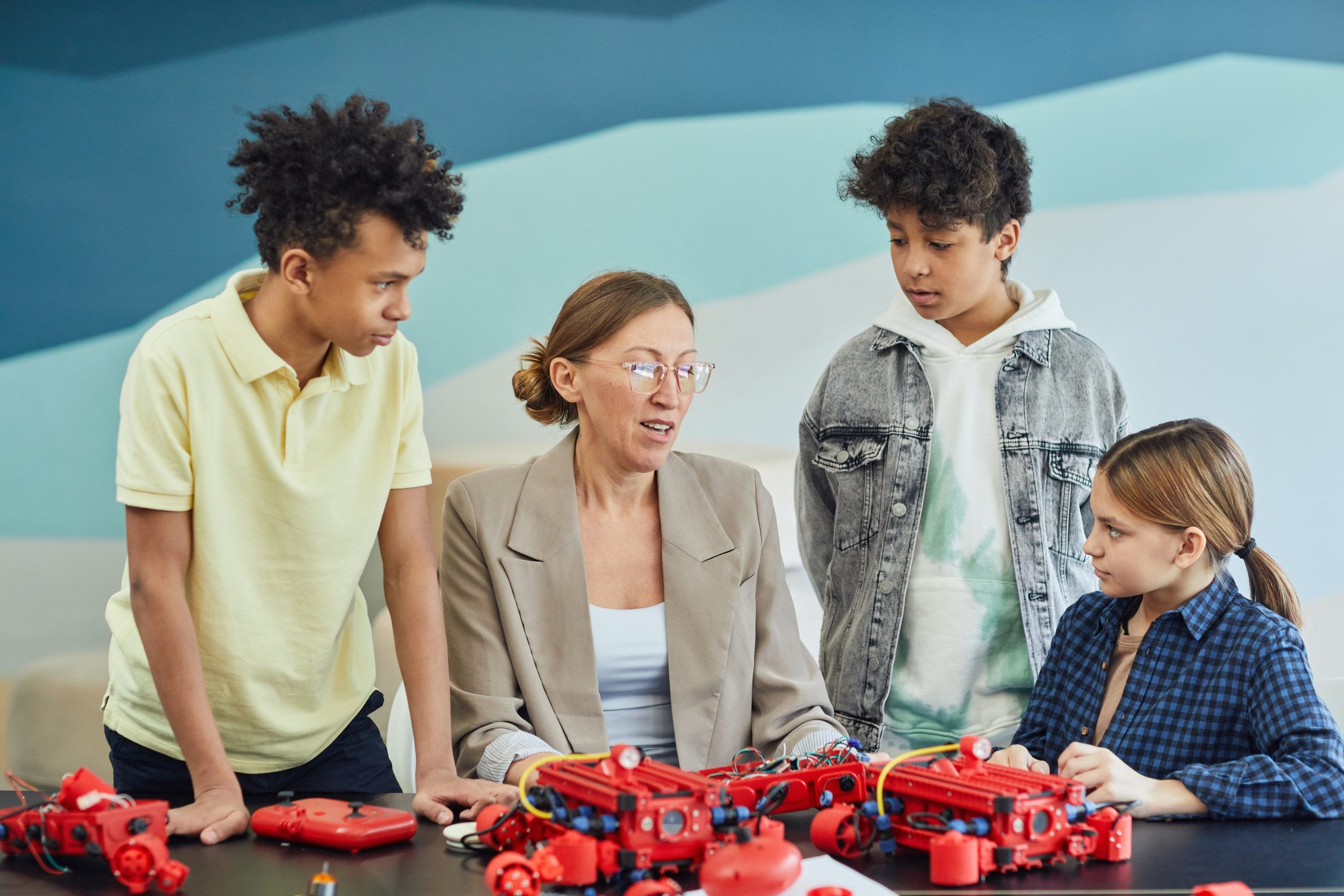Collaboration Between Teacher and Paraprofessional in Special Education
Collaboration between teacher and paraprofessional in special education is crucial for the success of students with functional needs. Effective collaboration allows for the sharing of knowledge and expertise, which can lead to improved instructional strategies and better outcomes for students.
Teachers and paraprofessionals should work together to identify the strengths and needs of each student and develop individualized plans to meet those needs. Communication is key, and regular meetings between teachers and paraprofessionals should be scheduled to discuss progress, concerns, and any necessary adjustments to the plan.
Teachers can also provide training and support for paraprofessionals, helping them to understand the curriculum, instructional methods, and behavior management techniques. In turn, paraprofessionals can provide valuable insights into the student’s needs, preferences, and progress.
It’s important to remember that collaboration is a two-way street, and both teachers and paraprofessionals should be open to feedback and willing to work together to create a positive and supportive learning environment for students with functional needs.
Legal and ethical considerations for Paraprofessionals in special education
Paraprofessionals in special education have a responsibility to ensure that they adhere to legal and ethical considerations in their work. Here are some of the key considerations they should be aware of:
1. Confidentiality: Paraprofessionals must keep all student information confidential, including academic progress, behavioral issues, and personal information. They should only share this information with authorized personnel who need to know.
2. Informed Consent: Before working with a student, paraprofessionals must obtain informed consent from the student’s parent or legal guardian. This means that they must explain the services they will provide, the potential risks and benefits, and any alternative options.
3. Boundaries: Paraprofessionals must maintain appropriate boundaries with students and their families. They should not engage in any behavior that could be perceived as inappropriate or unprofessional.
4. Non-Discrimination: Paraprofessionals must not discriminate against students based on race, gender, religion, disability, or any other characteristic protected by law.
5. Compliance with Laws and Regulations: Paraprofessionals must comply with all applicable laws and regulations related to special education, including the Individuals with Disabilities Education Act (IDEA), the Americans with Disabilities Act (ADA), and Section 504 of the Rehabilitation Act.
6. Reporting: Paraprofessionals have a legal obligation to report any suspected abuse or neglect of a student to the appropriate authorities.
7. Professionalism: Paraprofessionals should professionally conduct themselves at all times and maintain a positive working relationship with other professionals, parents, and students. They should also engage in ongoing professional development to improve their skills and knowledge in the field of special education.
Collaboration between teacher and paraprofessional in special education: By following these legal and ethical considerations, paraprofessionals can help ensure that they are providing high-quality services to students with functional needs while also upholding their professional responsibilities and obligations.
Improving communication skills as a paraprofessional in special education
Effective communication is essential for paraprofessionals working in special education. Here are some tips to improve your communication skills in this role:
1. Be clear and concise: Use simple language and avoid jargon or technical terms that may be confusing for students or parents.
2. Active listening: Listen carefully to what others are saying, and ask clarifying questions to ensure you understand their needs and concerns.
3. Non-verbal communication: Pay attention to your body language and facial expressions, as these can convey important messages to students and parents.
4. Use visual aids: Visual aids such as pictures, diagrams, or videos can help explain concepts or instructions to students.
5. Build relationships: Take the time to build positive relationships with students, parents, and other professionals. This can help establish trust and improve communication.
6. Practice empathy: Show empathy and understanding towards students and their families, as this can help build rapport and improve communication.
7. Seek feedback: Ask for feedback from students, parents, and other professionals, and use this feedback to improve your communication skills.
Building positive relationships with students as a paraprofessional in special education
Building positive relationships with students is crucial for paraprofessionals working in special education. Here are some tips to help you develop positive relationships with your students:
1. Show genuine interest: Take the time to get to know your students and show a genuine interest in their lives. Ask them about their interests, hobbies, and goals.
2. Be patient: Students with functional needs may require more time and patience, so be prepared to work at their pace and avoid rushing them.
3. Use positive reinforcement: Praise and reward students for their achievements and efforts, and use positive language to encourage them.
4. Be consistent: Establish consistent routines and expectations for your students, and follow through with consequences and rewards.
5. Be flexible: Be willing to adapt your teaching style and strategies to meet the individual needs of your students.
6. Be a good listener: Listen to your student’s concerns and opinions, and take them seriously.
7. Use humor: Humor can be a great way to connect with students and build rapport. Use appropriate humor to help students feel at ease and comfortable in your presence.
By following these tips, you can create a positive and supportive environment for your students. Remember that building positive relationships takes time and effort, but it is well worth it in the end. When students feel valued and supported, they are more likely to engage in learning and make progress toward their goals.
Collaboration between teacher and paraprofessional in special education: As a paraprofessional, your role is to support students in achieving their full potential. By building positive relationships with your students, you can help them feel more confident and motivated to succeed.
Roles and responsibilities of paraprofessionals in special education
Paraprofessionals play a critical role in supporting students with functional needs in the classroom. Here are some of the key roles and responsibilities of paraprofessionals in special education:
1. Providing instructional support:
Paraprofessionals work closely with teachers to provide instructional support to students. This may include working with individual students or small groups, assisting with assignments, and reinforcing concepts taught by the teacher.
2. Supporting behavior management:
Paraprofessionals also play a role in managing student behavior. They may assist with implementing behavior plans, providing positive reinforcement, and helping students to stay on task.
3. Monitoring student progress:
Paraprofessionals are responsible for monitoring student progress and reporting back to the teacher. They may collect data on student performance, track progress toward goals, and communicate with parents and other professionals as needed.
4. Assisting with personal care:
Depending on the needs of the student, paraprofessionals may also assist with personal care, such as feeding, toileting, and dressing.
5. Supporting inclusion:
Paraprofessionals are also responsible for promoting inclusion and ensuring that students with functional needs are integrated into the classroom as much as possible. They may work with the teacher to modify materials and adapt lessons to meet the needs of individual students, and they may also provide support to help students participate in group activities.
6. Maintaining a safe and supportive environment:
Paraprofessionals must also help to maintain a safe and supportive environment for all students. This involves monitoring student behavior, intervening when necessary, and ensuring that the classroom is organized and free from hazards.
Collaboration between teacher and paraprofessional in special education: Paraprofessionals have a challenging and rewarding job that requires a lot of patience, flexibility, and dedication. By working closely with teachers, parents, and other professionals, they can help to ensure that students with functional needs receive the support and resources they need to succeed in the classroom and beyond.
Career growth opportunities for paraprofessionals in special education
Paraprofessionals in special education have several career growth opportunities available to them. Here are some possibilities:
1. Pursuing advanced education: Paraprofessionals can pursue further education to become special education teachers. They can take advantage of programs that offer tuition reimbursement or scholarships to continue their education.
2. Obtaining certification: Paraprofessionals can become certified in a particular area of special education, such as autism or behavioral disorders. This certification can help them advance in their current role and increase their earning potential.
3. Gaining experience and taking on leadership roles: Paraprofessionals can gain valuable experience and take on leadership roles within their school or district. This can include serving as a mentor to other paraprofessionals or taking on administrative responsibilities.
4. Moving into related fields: Paraprofessionals can also move into related fields, such as social work or counseling. Their experience working with students with functional needs can be valuable in these fields.
Effective Strategies for Paraprofessional Support in Special Education
Paraprofessionals play an important role in the education of children with functional needs. They are often the first point of contact for students, and they can make a positive difference in their lives. However, there are some challenges that paraprofessionals face when working with students who have disabilities. These include:
- Time constraints
- Lack of training resources
- Difficulties communicating effectively
Paraprofessional Support in Special Education
Paraprofessional support in special education is a growing field that can be an excellent way to get started in the field of education. If you are interested in working with children with disabilities, but don’t have a teaching degree yet, being a paraprofessional is an excellent way to gain experience. Paraprofessionals provide services such as classroom assistance and behavior management for students who have been identified as needing extra help from their teachers due to their disability or other factors that make it difficult for them to learn in traditional classrooms.
The requirements for becoming a paraprofessional vary depending on your state’s laws regarding certification requirements for this position; however some general guidelines apply nationwide:
- You must be at least 18 years old
- You must have completed high school (or its equivalent)
Advantages of Paraprofessional Support in Special Education
As a paraprofessional, you are an important member of the team. Your role is to support students with disabilities by helping them learn new skills and strategies for success in school. You can help them build positive relationships with their peers, teachers, and other adults on campus; improve communication between home and school; increase independence in daily living skills such as dressing appropriately for weather conditions or following directions correctly when going on field trips; develop self-esteem through participation in activities such as sports teams or clubs; make choices that support academic success (like choosing appropriate homework assignments).
Disadvantages of Paraprofessional Support in Special Education
- Inadequate Training
- Lack of Job Security
- Potential for Abuse
Conclusion
In this article, we reviewed the benefits of paraprofessional support for students with functional needs. We also discussed effective strategies for implementing a paraprofessional program in your school district.
We hope you’ve found this information useful! If you have any questions or comments about Paraprofessional Support in Special Education, please leave them below.

Meet Jerry Glover, a passionate educator and expert in Paraprofessional education. With over 10 years of experience in the field, Jerry has dedicated his career to helping students with diverse learning needs achieve their full potential. His extensive knowledge of Paraprofessional education has enabled his to design and implement effective strategies that empower paraprofessionals to provide exceptional support to students.
Jerry is a certified Paraprofessional educator and has worked with students from various backgrounds, including those with special needs and English Language Learners. He has also provided professional development training to paraprofessionals across different schools, helping them hone their skills and improve student outcomes.
In addition to his work in Paraprofessional education, Jerry is also a published author and speaker, sharing his insights and expertise at various conferences and events. His passion for education and commitment to excellence make him a valuable resource for anyone looking to improve Paraprofessional education and support the needs of all learners

1 thought on “Collaboration Between Teachers and Paraprofessionals in Special Education”